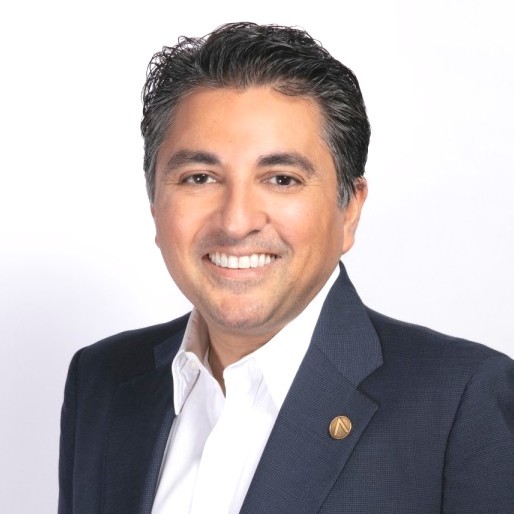|

IS20 Coverage: Impact Sourcing Breaks Barriers for Workforce of the Future
By: Sandy Frinton, PULSE Editor
With COVID-19 as a catalyst, work can now be done from everywhere in the world, creating tremendous new opportunities for jobs and career paths for disadvantaged youth who have been limited by geography or socioeconomics.
The global pandemic has truly broken down all the borders globally. Enabled by digitalization and technology, now anyone can work from anywhere in an instant. This is the workforce of the future,” Kevin Parikh, CEO & Chairman, Avasant, said in opening IS20, IAOP’s first conference dedicated solely to impact sourcing and social responsibility sponsored by the Avasant Foundation and Sykes.
A presentation and panel discussion hosted by Avasant on Workforce of the Future: Developing Talent for the Digital Economy explored how the current virtual work environment spurred on by COVID-19, combined with the strengthening impact sourcing movement and the digital economy have become key to workforce development.
In opening remarks, Parikh stressed that “digitalization and globalization are leveling the playing field,” removing the barriers to employment historically created by physical location or socio-economic status.
In this new future of work, it is “imperative that young people are not left behind,” he said, noting that 267 million youth are underemployed and 30 percent are living in poverty with 90 percent of those individuals living in developing countries.
“If we don’t do something now, an entire generation will be left behind in this digital world where the rules are different and the ability to find and move into these new jobs are also different,” Parikh said.
Impact sourcing is critical to breaking the cycle for the future. This growing practice of integrating poor and vulnerable populations, particularly youth, into the workforce across global supply chains delivers tangible economic benefits.
These include an income benefit for over 50 percent and up to 200 percent of impact workers when higher global wages make it to developing regions; a huge spillover economic ripple to as many as six additional family members; and stronger employee engagement with attrition rates that are 15 to 40 percent lower for companies.
The Future Workforce
According to Avasant, this new workforce is distributed and transboundary. The location of the job is enabled by digital and unified communications. Employees will have the ability to work in harmony with technology and automation with continuous opportunities to upskill and reskill, and harness their creative energies.
When reimagining outsourcing functions, roles and responsibilities, price sensitivity will become an important factor due to a 15 percent decline in managed services costs from redistributed wages, exchange rates and currency devaluation.
Employers in an instant will now have the ability to move volumes of work from one location to another, creating tremendous price elasticity and flexibility in wages, and a fiercely competitive environment between developing and more mature markets, he said.
The jobs of the future include process automation in such areas as accounting, finance and even engineering to help companies become more efficient and productive; data analytics to make data more meaningful to companies; and digital experience to drive more meaningful customer engagement.
“It is an exciting time,” Parikh said. “These are services that can be distributed on a global basis that we can train for and don’t necessarily require higher education. There is the opportunity to create new jobs in this digital economy without eliminating old jobs.”
Business Value of Impact Sourcing
Moderated by Chitra Rajeshwari, Executive Director, Avasant Foundation, a panel of experts representing global leaders from a development agency for the Caribbean/Latin America, a service provider who creates job opportunities for deserving youths and an enterprise business demonstrated the value of impact sourcing from the business perspective.
The panelists discussed the challenges of skills training in the current remote work environment and post pandemic. According to the World Economic Forum, by the year 2025, employees will need skills like analytical thinking and innovation, active learning, complex problem solving, creativity, leadership, social influence, resilience, tolerance and flexibility.
James Rinaldi, Avasant Fellow, Chief IT Advisor and Former CIO, NASA Jet Propulsion Laboratory, said that a remote outsourcing workforce will increasingly be needed because companies will not be able to hire the large numbers of employees needed with the aging workforce retiring who possess all the relevant skills in light of the fast pace of technological change.
Vashtie Dookiesingh, Private Finance Operations Senior Specialist, Inter-American Development Bank Lab, said it is critical to provide training in technology skills that will be relevant to the private sector and the particular work environment since each country’s needs are different.
The panelists agreed that creating a positive, nurturing and protective training environment where job seekers can learn fundamental skills like interviewing and safely make mistakes is vital for the future success of these young people, many of whom come from impoverished backgrounds and face greater initial obstacles.
Dookiesingh shared that 70 percent of youth in Latin America/Caribbean don’t have skills to get good quality jobs and 31 percent have not finished high school, which contributes to crime.
“Their backgrounds have robbed them of their humanity,” she said. “The starting point for them is to learn empathy. They need a different beginning. The payoff is transformational to their lives and their families.”
Anand Birader, Senior Vice President and Country Head, HGS, said the coronavirus has helped open access to jobs that previously were not attainable for youth living in rural communities because they were unable to come to the city or live away from their families.
Providing access to the Internet, broadband capabilities and mobile devices will all be crucial for the success of training and employing youth in developing countries. Jobs in the gig economy and entrepreneurial opportunities also will create valuable new opportunities, the panelists said.
Rajeshwari concluded the session with a call to action to the audience “to create an inclusive ecosystem to empower the workforce for a digital future.”
|

IS20 Coverage: CSR That’s all About Community
By: Sandy Frinton, PULSE Editor
At SYKES, CSR might be more aptly defined as “Community Social Responsibility” because this Business Process Outsourcing leader truly is making an impact that reaches far beyond its company walls.
In opening the second day of IS20, business leaders from SYKES presented a panel discussion on How Corporate Social Responsibility Begins with Community Partnerships.
Embracing its purpose of “helping people, one caring interaction at a time, SYKES is positively impacting the lives of its 55,000 employees located in 23 countries through the jobs it provides – but its reach goes much further.
The panelists highlighted the company’s prosperity hubs that are revitalizing entire cities, and its language and technology academies that prepare individuals for jobs and promote equity in hiring.
Ian Barkin, Chief Strategy & Marketing Officer of SYKES, shared how the company has partnered with governments, institutions and academia in its communities to add an even greater impact that has a ripple effect on families, towns, small businesses, countries, and industries.
“These initiatives -- from language and technical academies to prosperity hubs -- are all about tapping into talent,” Barkin said. “We have found passion, intelligence, capability and drive and we are supercharging it by giving people the skills and capabilities they need for their own well-being and to serve in roles in SYKES.”
Prosperity Hubs
Through a partnership with Intuit since 2016, the company’s “prosperity hubs” in North America are providing full-time jobs, vocational training and educational resources to economically distressed communities. These hubs are located in small towns in Wise Virginia; Hazard, Kentucky; and Morristown, Tennessee. The company is exploring building on the concept internationally.
Todd McReynolds, Senior Vice President, Client and Operations Management, North America, said the company has found communities that offer top talent and the willingness to learn and has provided progressive careers. Over the past two years, SYKES has made investments to upskill and develop its employees, resulting in almost 70 full-time promotions.
One of the many success stories he shared was the story of a first-generation college graduate who started with the company as an intern. The mentoring and support he received changed his outlook and led him to a full-time job with increased responsibility as a trainer at the Morristown site. His promotion allowed his wife to pursue her Ph.D. in biomedical sciences and conduct clinical research in cancer treatment.
“The amount of hope I received changed the course of my life forever,” Austin Schenk said. “Everything I have learned has set me up to go out and make a difference in the world.
To see Austin’s story, click here: https://www.youtube.com/watch?v=2F3MQq-iiNA
Training Academies
The company also is empowering economic development in Latin America through its training academies based in Costa Rica.
A nonprofit language learning academy, The SYKES Academy serves thousands of students in Costa Rica, the Philippines, Egypt, Romania, Mexico and El Salvador by teaching English language skills to native Spanish speakers. It then connects graduates with job opportunities at SYKES or other companies.
Of the 75,000 bilingual people in Costa Rica, SYKES has trained more than 13,000 of these citizens, helping them to gain employment at either its company or other multinationals located in the country.
SYKES has partnered with the government that provides funding for Academy candidates and is replicating its program, helping to strengthen the country’s economy and its industry sector.
The SYKES Tech Academy provides technical education to students and existing employees and develops specialists in qualified networks that serve local markets. In addition, the company offers a women in technology program that provides training for in-demand tech skills and mentoring that helps these talented individuals advance in their careers.
“We have had people that had no other options for jobs or income who have seen doors open for them at SYKES and received offers at other companies,” said Roy Mena, Director, Area Administration, Corporate Affairs, Latin America. “In the end, it’s not only about doing the right thing for the business. It’s about doing the right thing the right way for the people and communities.”
Diego Mora Vargas, Director, Account Operations, Latin America shared a story about the positive impact the Tech Academy had on one individual who started working for the company in the cafeteria. Seeing the growth others had through training, he successfully completed both the tech and language academies and even learned a second language. He went on to become a Cisco technical support engineer and a high-level leader with SYKES.
COVID Impact
When COVID-19 hit the world, SYKES was in a good position because it had the technology and virtual platforms in place to deliver its language and technology skills training programs.
Since the pandemic, it has conducted more than 100 remote classes on English language capabilities and partnered to reach individuals in their remote locations. SYKES also has been able to expand its tech classes through virtual learning.
SYKES leveraged its tremendous amount of experience delivering services through its Work-At-Home model. Deciding in March 2020 to transition thousands of jobs at its Prosperity Hubs to remote work, it was able to put the safety of its employees first and protect their livelihoods.
“We are performing better than we ever did before because we all pulling all our resources and embracing this environment,” McReynolds said. “We will come out of the other side better and stronger when we return to a ‘better normal’.”
According to Barkin, “COVID-19 accelerated our adoption of technology and more virtual work. We were able to not just survive but thrive.”
SYKES, a leading provider of multichannel demand generation and customer engagement services, was a key partner of IS20, along with the Avasant Foundation.
During an exciting Lightning Round at OWS21 on The Future Promise of Outsourcing, Barkin shared his professional journey in the outsourcing industry and offered his perspective on the current state and future promise of outsourcing, including the industry’s increasing emphasis on meaningful experiences, sustainability and impact sourcing.
|